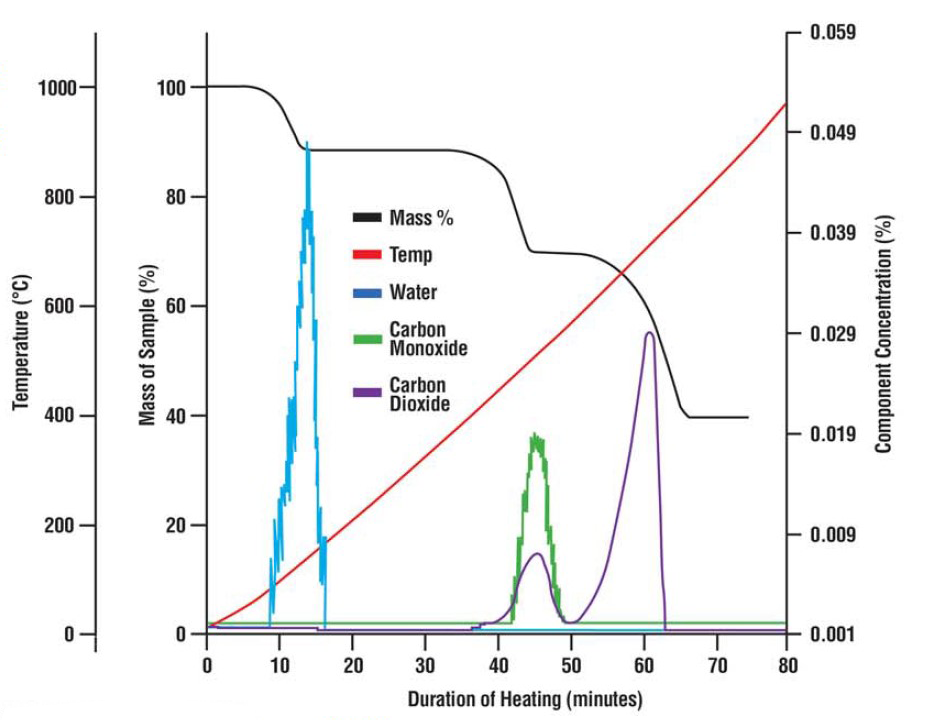Evolved Gas Analysis
EVOLVED GAS ANALYSIS
Evolved Gas Analysis (EGA) is a type of analytical technique used to study the thermal or chemical properties of materials. EGA involves the measurement and analysis of gases evolved from a sample as it is heated or exposed to other stimuli, such as light or radiation.
industries
EGA is commonly used in a range of industries, including materials science, chemistry, and pharmaceuticals. Evolved Gas Analysis (EGA) is used in a wide range of industries for various purposes. Some of the industries that use EGA include:
- Materials science: Used in materials science to study the thermal and chemical properties of polymers, composites, ceramics, metals, and other materials. It can be used to determine the composition, thermal stability, and other properties of materials.
- Pharmaceuticals: Used in the pharmaceutical industry to study the stability and degradation of drugs and drug products. It can be used to determine the effects of temperature, humidity, and other factors on the chemical stability of drugs.
- Energy: Used in the energy industry to study the thermal properties of fuels and other energy sources. It can be used to determine the combustion properties of fuels, and to study the effects of thermal and oxidative degradation on fuel quality.
- Chemicals: Used in the chemical industry to study the properties of chemical compounds and reactions. It can be used to determine the thermal stability of chemical compounds, and to study the kinetics of chemical reactions.
- Environmental science: Used in environmental science to study the thermal and chemical properties of pollutants and other environmental contaminants. It can be used to determine the thermal stability and degradation of these contaminants, and to study the effects of temperature and other environmental factors on their behavior.


SALES | SERVICE | TRAINING
Americas +1 412.967.5754
EMEA +49 69 20436910
China/APAC +86 400 086 0106
Our EXTREL™ MAX300-EGA™ gas analyzer is a type of instrument used in Evolved Gas Analysis (EGA) to measure and analyze the gases evolved from a sample as it is heated or exposed to other stimuli. This analyzer typically consists of a furnace or other heating element where the sample is placed, and a mass spectrometer that is used to detect and analyze the gases released from the sample.
In operation, the sample is heated or otherwise stimulated, and the gases that are released from the sample are drawn into the mass spectrometer. The mass spectrometer then separates and analyzes the different gases based on their mass-to-charge ratio, providing information on the types and amounts of gases released from the sample.
The MAX300-EGA gas analyzer is a highly sensitive and versatile instrument that can be used in a range of EGA applications, including the analysis of polymers, plastics, composites, and other materials. It can also be used in thermal analysis, reaction kinetics studies, and other research applications.
Benefits
- High sensitivity: Can detect very small amounts of gases, making it a highly sensitive instrument that can provide detailed information on the composition of samples.
- Fast analysis: Can rapidly analyze gases released from a sample, providing real-time data on the thermal or chemical properties of the sample.
- High resolution: Can separate and analyze different gases based on their mass-to-charge ratio, providing high-resolution data on the types and amounts of gases released from a sample.
- Versatility: Can be used in a range of EGA applications, including the analysis of polymers, plastics, composites, and other materials. It can also be used in thermal analysis, reaction kinetics studies, and other research applications.
- User-friendly: Designed to be easy to use, with an intuitive interface that allows researchers and analysts to quickly set up and run experiments.
- Comprehensive software: Comes with comprehensive software that allows for advanced data analysis and visualization, making it easier to interpret and understand the results of EGA experiments.
Applications
- Thermogravimetric Analysis/ Mass Spectrometry (TGA-MS)
- Pharmaceuticals
- Material Science
- Microreactors/ Continuous Flow Systems
- Reaction Monitoring
- Organic Chemistry
- Natural Product Analysis
- Synthesis Studies
- Pilot Scale Process/ R&D
- QA/ QC
